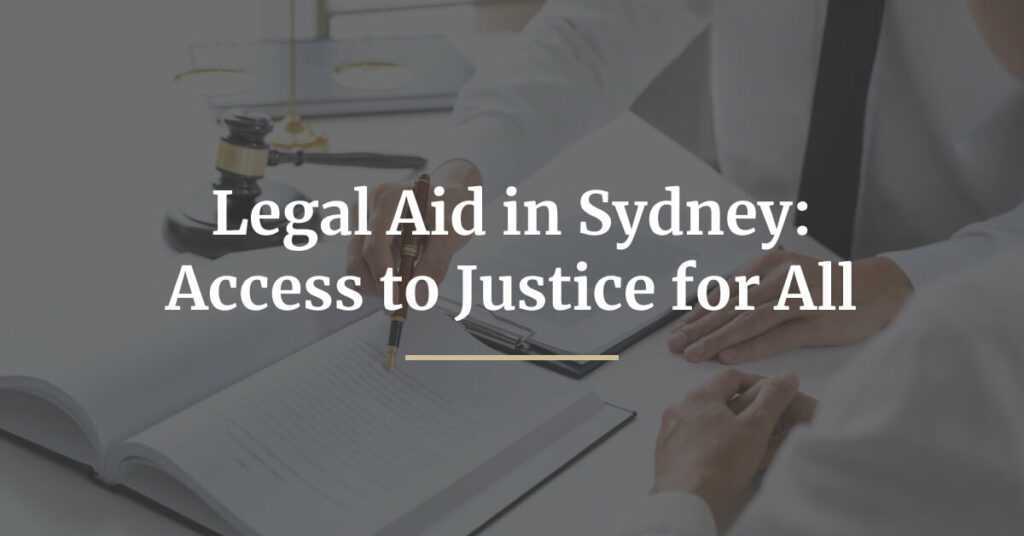
Legal Aid in Sydney: Access to Justice for All
In a city as vast and diverse as Sydney, the pursuit of justice remains a cornerstone of its societal framework. Legal Aid emerges as a beacon of hope for those who might otherwise struggle to navigate the intricate corridors of the legal system. In this comprehensive guide, Empower Wills & Estate Lawyers delve into the heart of Legal Aid in Sydney, offering clarity on its purpose, who can benefit from it, and how to traverse its processes seamlessly. Whether you’re seeking representation or simply wish to understand this pivotal service, this blog post serves as your informative compass.
What is Legal Aid?
Legal Aid in Sydney is a vital mechanism ensuring that all individuals, irrespective of their socio-economic status, have access to the legal system. At its core, Legal Aid provides free or subsidised legal assistance to those in Sydney and across NSW who might not otherwise afford legal representation or advice. This service, primarily funded by the government, is a testament to the belief that justice should not be exclusive to those with deep pockets.
Legal Aid in Sydney encompasses a range of services including advice on legal matters, representation in court, and public legal education. These services cover various areas of the law, such as family disputes, criminal defence, civil matters, and more. Moreover, specialised departments within Legal Aid NSW address unique legal challenges, like Indigenous legal matters or issues faced by the elderly.
Who Qualifies for Legal Aid?
The primary determinant for qualification for Legal Aid in Sydney is financial means, but the nature and seriousness of the legal matter in question also play a role.
- Financial Eligibility: Legal Aid NSW has set thresholds based on income, assets, and expenses. Those with an income or assets above these thresholds might not qualify for full Legal Aid services but could still receive some form of subsidised assistance.
- Legal Merit: Not all legal cases will be supported by Legal Aid. The case must have sufficient legal merit, meaning there’s a reasonable prospect of success or the matter is of significant public interest.
- Residence: While not strictly a residency-based service, preference is given to those living in NSW. However, certain matters involving federal laws can extend assistance to non-NSW residents.
- Nature of the Legal Matter: Legal Aid in Sydney predominantly assists with family law, criminal cases, and certain civil law matters. Some areas, like commercial disputes or conveyancing, typically don’t fall under the purview of Legal Aid.
It’s also worth noting that even if one qualifies for Legal Aid, a financial contribution might be required, depending on the individual’s financial circumstances. However, this contribution is often substantially less than standard legal fees.
Those unsure about their qualification status should approach Legal Aid NSW or one of Sydney’s many community legal centres for a more detailed assessment and guidance.
The Role of Legal Aid Lawyers
Legal Aid lawyers, often referred to as public defenders or legal aid solicitors in some jurisdictions, play an integral role in the judicial system, particularly in Sydney and the wider NSW region. Their primary purpose is to ensure that individuals who can’t afford private legal representation still have their rights upheld and can navigate the often complex legal terrain.
- Representation in Court: One of the most evident roles of a Legal Aid lawyer is to represent clients in court. Whether it’s for family disputes, criminal defence, or civil cases, these lawyers ensure that their clients’ perspectives are put forth and their rights are safeguarded.
- Legal Counselling: Beyond court representation, Legal Aid lawyers provide advice on a wide array of legal matters, guiding individuals through the intricacies of the law and helping them make informed decisions.
- Mediation and Dispute Resolution: In many cases, especially in family law, Legal Aid lawyers facilitate mediation, aiming to resolve matters outside the courtroom, which often results in faster and less contentious outcomes.
- Educational Outreach: Legal Aid lawyers in Sydney often engage in community education, offering workshops, seminars, and resources to educate the public about their legal rights and responsibilities.
Benefits of Legal Aid to the Community
Legal Aid’s influence extends beyond just the individuals it directly serves; it has broader implications for the Sydney community and society at large.
- Ensuring Equal Access to Justice: At its core, Legal Aid levels the playing field, ensuring that financial capability isn’t the determinant of one’s access to justice. This upholds the principle that justice should be universally accessible.
- Promoting Social Cohesion: By providing legal services to marginalised and vulnerable groups, Legal Aid fosters a sense of inclusivity, making them feel valued and recognised within the community.
- Reducing Court Delays: By facilitating legal representation for all, Legal Aid can help streamline court processes, reducing the number of self-represented litigants who might lack the expertise to efficiently navigate the court system.
- Educating the Public: Through outreach programs and educational resources, Legal Aid fosters a more legally aware community, leading to fewer legal infractions and a more harmonious society.
- Setting Legal Precedents: Many cases taken up by Legal Aid lawyers, especially those of significant public interest, have the potential to set legal precedents, shaping the judicial landscape for the future.
In essence, Legal Aid’s benefits to the community are manifold, creating not just a legally equitable society but also fostering social harmony, efficiency in the legal process, and an informed public.
How to Obtain Legal Aid
Legal Aid in Sydney aims to ensure everyone has access to justice, irrespective of their financial standing. If you believe you might qualify and are seeking assistance, here’s a step-by-step guide to obtaining Legal Aid:
- Determine Eligibility: Before applying, it’s essential to understand whether you qualify for Legal Aid. Criteria often include your financial situation, the nature and seriousness of your legal issue, and whether providing aid is in the interests of justice.
- Gather Necessary Documentation: This typically includes proof of income (like pay slips, bank statements, or Centrelink documents), information on assets (such as properties or vehicles), and details about your legal issue.
- Visit the Legal Aid NSW Website: Here, you can access the online application form and find information on the documentation required.
- Consult a Legal Aid Office: Sydney houses multiple Legal Aid offices. It’s a good idea to visit in person if you have queries or need assistance with your application. They can provide preliminary advice and guide you on the application process.
- Submit Your Application: This can often be done online, in person at a Legal Aid office, or through a private lawyer who does Legal Aid work. Ensure all details are accurate to prevent any delays.
- Await Assessment: Once submitted, your application will be assessed based on the merits of the case and your financial eligibility. This may take some time, depending on the complexity of your situation.
- Receive Outcome: You’ll be informed whether your application was successful or not. If granted Legal Aid, details about your assigned lawyer and the next steps will be provided.
Navigating the Legal Aid Process
Venturing into the legal landscape can be daunting, especially if it’s your first time. Here are some insights to help you smoothly navigate the Legal Aid process in Sydney:
- Understand Your Rights: Every individual has the right to fair representation. Familiarise yourself with the basics of your legal issue so you can better understand the advice and information provided to you.
- Open Communication: Always be honest and transparent with your Legal Aid lawyer. Providing them with all the relevant details ensures they can represent you effectively.
- Stay Proactive: While your lawyer will guide you, it’s beneficial to stay engaged, ask questions, and actively participate in your case.
- Know the Limitations: Legal Aid resources can sometimes be stretched due to high demand. Be patient and understanding of the constraints, and always keep your appointments to ensure the process flows smoothly.
- Seek Additional Support: Beyond legal representation, many community organisations in Sydney offer support to individuals undergoing legal challenges, from counselling services to community workshops.
- Stay Updated: Legal Aid might require additional documentation or information as your case progresses. Ensure you respond promptly to any requests and keep yourself updated about any changes or developments.
- Finalise Matters: Once your case concludes, there may be additional paperwork or steps to finalise everything. Ensure you complete these promptly and check with your Legal Aid lawyer about any lasting implications or advice.
By understanding the steps and maintaining an active role in your legal journey, you can navigate the Legal Aid process more confidently, ensuring you receive the best possible representation and outcome.
The Key Takeaways
Legal Aid in Sydney stands as a testament to the city’s commitment to fairness and equitable access to justice. By understanding its intricacies, eligibility criteria, and the pathway to avail it, individuals can ensure that their legal rights are upheld, regardless of their financial circumstances.
About The Author

Oliver Morrisey LL.M lives and breathes succession law.
Oliver is the Founder and Director of Empower Wills and Estate Lawyers, a law practice specialising in will and estate disputes. Oliver prides himself on the business providing the following customer-centric promises:
1. developing a professional client relationship built on trust.
2. achieving the best outcome for the client.
3. delivering quality services to the client efficiently and effectively.
Located in Edgecliff in Sydney's Eastern Suburbs, Oliver travels regularly to visit clients who choose him for his extensive knowledge and experience.
Oliver invites partnerships or referral enquiries.
